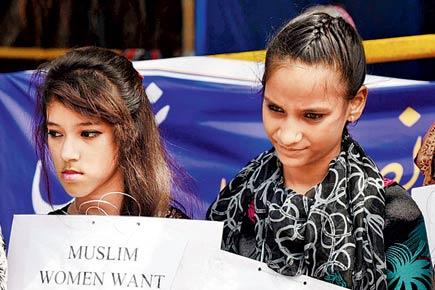The Indian govt and the community need to come together to ensure gender equality in Islam; Friday’s affidavit in the Supreme Court is a step in that direction


ADVERTISEMENT
 In the course of work for gender justice in Islam and equal citizenship for women, one has come across numerous instances across different states of women suffering owing to lack of education, low economic status, no property ownership such as a home and triple talaq, polygamy as well as nikah halala.
In the course of work for gender justice in Islam and equal citizenship for women, one has come across numerous instances across different states of women suffering owing to lack of education, low economic status, no property ownership such as a home and triple talaq, polygamy as well as nikah halala.
Marginalisation of women is systemic in a male-dominated society where self-appointed clerics have imposed a patriarchal as well as misogynist worldview in the name of religion. Correcting this situation demands a multi-pronged approach both within the community and involving the government.
The affidavit filed by the Centre in front of the Supreme Court bench hearing triple talaq petition is a step in the right direction. The stand taken in this affidavit that practices such as triple talaq, nikah halala and polygamy, are not only violative of Constitutional principles of gender justice and equality, but also are unIslamic is the correct stand. The affidavit mentions that since the practice of triple talaq is regulated in several Muslim countries that follow the Islamic Shariah law, the contention of the likes of personal law board become redundant. This position on the part of the government is in keeping with its Constitutional obligation of gender justice. We have been arguing that triple talaq is unQuranic as well as unconstitutional.
Shayara Bano and other Muslim women were left with no option but to approach the apex court, as the so-called leaders of the community would not allow any voices of women to be heard. Nor would they allow the Quranic injunctions of justice and equality for women to be translated into reality. Any efforts in this regard have forever been termed as “interference in our faith” and several conspiracy theories have been invoked.
The Muslim women today are challenging the patriarchal stranglehold on the community, and on religion, by orthodox forces who are imposing their own male-centric worldview on them.
A national study Seeking Justice in Family released in 2015 found that 92 per cent of Muslim women surveyed wanted abolition of triple talaq. An overwhelming 85 per cent wanted a comprehensive reform in Muslim personal law and wanted the Parliament of India to enable this. They spoke clearly that they expect the government to pass a codified Muslim family law, to protect them against triple talaq, polygamy, rights in property, guardianship and custody of children etc. These women are demanding their rights as per the Quran, as well as citizens of India.
It is the obligation of the government and all democratic institutions to take cognizance of these aspirations of Muslim women.
The Personal Law Board does not speak for Indian Muslims. Sample this from their affidavit submitted to the Supreme Court, “though pronouncement of triple talaq is considered to be a sin it is still a valid and effective form of divorce.” And “Shariah grants the right to divorce to husband because men have greater power of decision making. They are more likely to control emotions and not to take a hasty decision”. This needs no further comment. They clearly do not represent the voice of ordinary Muslims. In the same affidavit they invoke the Constitution: in our constitutional scheme, it is oft-repeated truism that the Preamble of the Constitution encapsulates basic values thereof.
Amongst other freedoms guaranteed under the provisions of the Constitution, the most cherished one is the freedom of conscience as contained in Articles 25 and 26 of the Constitution. The preamble clearly enshrines values of liberty of thought, expression, belief, faith, worship. Further, Article 25 of the Constitution, guarantees freedom of conscience and freedom to profess, practice and propagate religion. Article 25 guarantees individual freedom of conscience subject to public order, morality and health and to the other provisions of the third part of the Constitutions. Article 26 of the Constitution grants freedom to every religious denomination or any section thereof to manage its own affairs and so on… This selective invocation of the Constitution is a patriarchal game that needs to be understood.
The Government of India would do well to stand by the Muslim women in their quest for justice and equality. The affidavit filed on Friday offers us hope in this regard.
- Inputs by Noorjehan Niaz
Zakia Soman and Noorjehan Niaz are co-founders of the Bharatiya Muslim Mahila Andolan and petitioners in the Haji Ali and triple talaq caseSend your feedback to mailbag@mid-day.com
 Subscribe today by clicking the link and stay updated with the latest news!" Click here!
Subscribe today by clicking the link and stay updated with the latest news!" Click here!






